Tinea Capitis How to treat itchy head and dandruff?
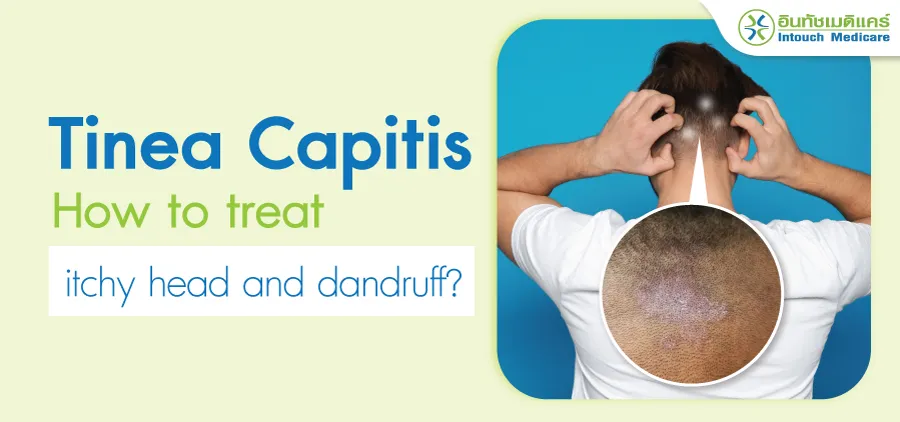
Tinea Capitis There is often an itchy scalp, hair loss, and dandruff. They occur frequently and often cause a lot of worry and loss of confidence for us, so don't let the symptoms spread. It's best to consult a doctor immediately.
So what causes the Tinea Capitis on the head to occur? If you have it and want to treat it, what should you do? The doctor has gathered together knowledge about this matter.
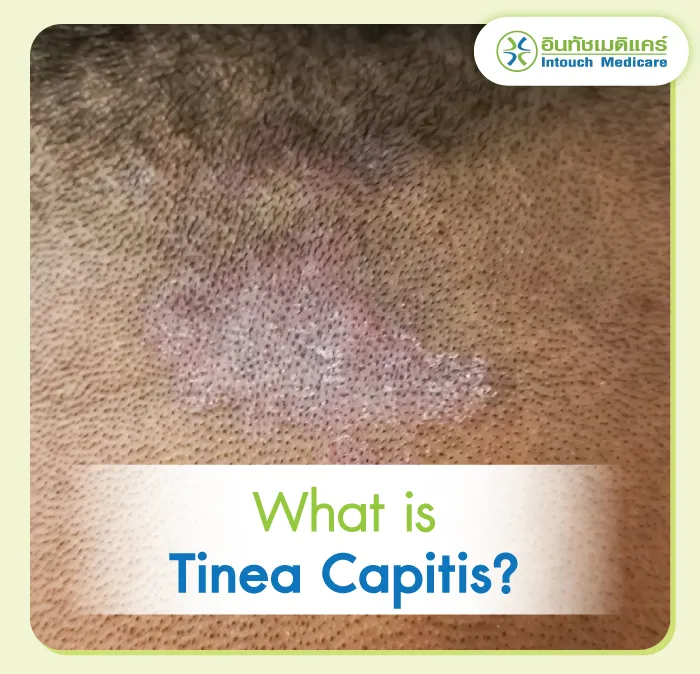
What is Tinea Capitis?
Tinea capitis is caused by fungi from the Dermatophytes group. (Dermatophytes) This type of fungus can be found from pets, people, and in the soil. It is a disease that occurs in the scalp and hair follicles.
Found in children more than adults. |
Symptoms found are an itchy scalp, itchy scalp, and hair falling out in patches. Some people will develop fluid-filled granules around the pores, which then spread into large, raised lumps and become inflamed, with lymph, pus, and scabs on the wound. Locals call it "Channatu" or Kerion. As a result, hair in this area does not grow back as usual.
Click to see pictures of scalp ringworm.
Causes of Tinea Capitis
Got infected by a person infected with fungus.
 When we are close to each other, we can communicate with each other. or sharing items such as combs, sleeping on the same pillow, and hair towels
When we are close to each other, we can communicate with each other. or sharing items such as combs, sleeping on the same pillow, and hair towels Get infected from pets, touching unclean dogs or cats and not washing your hands before touching your face or hair.
Getting your hair done at a beauty salon There are some hair tools that are often used together. If not taken care of or cleaned well Infections may also occur from sharing items.
Dirty scalp Haven't washed my hair for a long time. A blockage has occurred. and becomes a breeding ground for fungus, such as wearing hats regularly for a long time
Symptoms of Tinea Capitis
Period without symptoms
It is said to be a carrier of ringworm on the head, not itchy, not having hair loss. But there may be dandruff on the scalp, which is infected and can be transmitted to other people.
In cases with mild symptoms 
will show many symptoms Initially, the fungus will start to infect the scalp first. Then it spreads into the hair. Makes hair pale in color hair becomes more brittle They tend to fall off and fall out in patches. and see black spots on the scalp, including itchy scalp
Patients with severe symptoms
Small, red, inflamed circles begin to appear on the scalp. Then it will continue to expand. and forms pustules around the hair follicles There is an inflamed lump. Itching and pain and there was a lot of lymph flowing out In some cases, there is pus mixed in as well. In addition, enlarged lymph nodes in the neck may also be found. The villagers often call this stage of symptoms "Channatu".
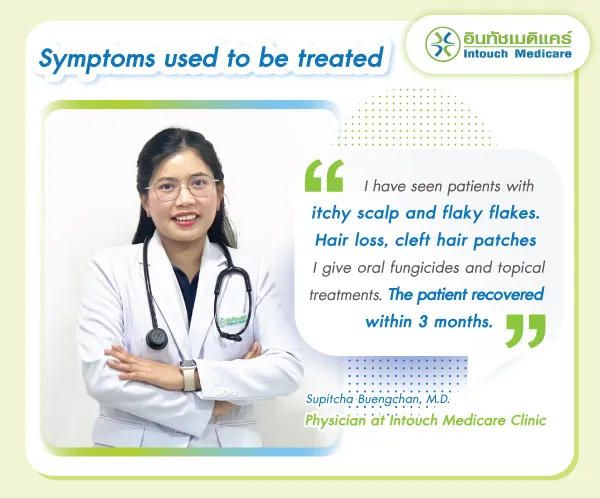
"I once had a patient with an itchy scalp. The scabs are flaky and the hair is falling out. The fruit is cleft in patches all over the head. It's been like this for 1 month. I bought medicine to treat it myself and it didn't go away. Symptoms do not improve I also did a history and physical examination of the patient. It was found to be an infectious disease on the scalp. Caused by a fungus that does not yet have symptoms of scalp inflammation.
In this case, I gave oral medicine to kill the fungus and topical treatment. By using fermentation with shampoo. To help reduce the spread of infection. Use it 2 times a week, leave it on for 5-10 minutes at a time, and make an appointment to follow up every month. The patient recovered within 3 months."
- SUPITCHA BUENGJAN, MD. Clinical Physician -
Symptoms that should see a doctor immediately
If found to have symptoms The scalp is constantly itchy, hair is falling out, hair is cracked in patches. There are chronic scabs and flakes, and itching increases.
If it's been chronic for a long time. and began to experience severe scalp inflammation , such as pustules forming around the hair follicles The scalp is swollen and red, painful, itchy, and spreads into raised lumps. There is lymph or pus. and/or the surrounding lymph nodes can be felt, swollen and enlarged Hurry and see a doctor.
Have a history of taking medicine or purchasing shampoo to treat it Symptoms don't improve
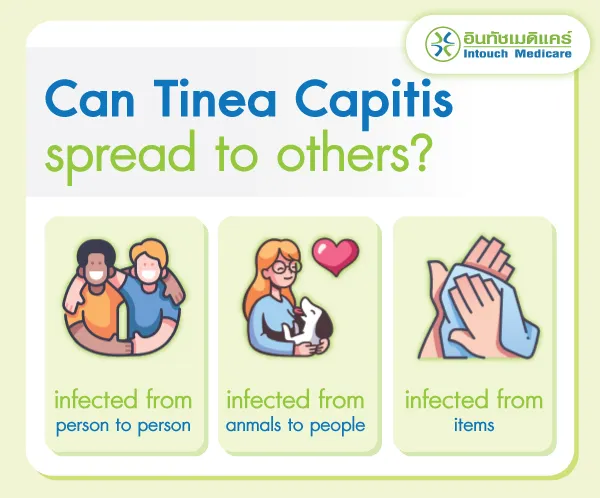
Can Tinea Capitis spread to others?
The answer is Tinea Capitis, It' s a contagious disease.
Infected from person to person
It usually spreads through direct skin contact with an infected person.
Infected from animals to people
By touching an animal that has ringworm The virus spreads when we touch our kittens or dogs. It is common in kittens, puppies, cows, goats, pigs and horses.
Infected from things
Patients with this disease often do not maintain cleanliness. This can be transmitted through the sharing of contaminated scissors, combs, and razors, especially by monks and nuns, etc.
Is Tinea Capitis dangerous?
It's not dangerous but if left alone or accompanied by inflammation, it will cause pain. For those who have already had symptoms, the symptoms are not severe or not inflamed. It will have a greater impact on confidence in daily life. Because my hair is falling out in small patches. It is clearly seen that the constant itching of the head also affects the personality.
How long does it take to treat Tinea Capitis?
It takes approximately 1-3 months to heal and depends on the severity of the disease.

"Because Tinea Capitis takes a long time to heal, approximately 1-3 months or more. Depends on the severity of the disease This patient took 3 months to recover.
I made an appointment to follow up every month. After 1 month, it was found that the flakes on the scalp had decreased. and there was no further expansion of the lesion No additional inflammation Much less itching In some places, small hairs began to appear. starting to happen Consider reducing your medication.
I made a follow-up appointment in the 2nd month and symptoms started to improve a lot. New hair begins to grow more. And there is no itching anymore. I considered making appointments further apart in the 3rd month. The results showed that the patient recovered much better. The lesions almost disappeared. Until I doesn't have an appointment anymore."
- SUPITCHA BUENGJAN, MD. Clinical Physician -
How to treat Tinea Capitis
Many people want to know how to treat it. Tinea Capitis or treating ringworm on the head due to This problem has been a long time coming, no matter what I do it won't go away. The doctor will diagnose each patient and determine who should be treated and how.
![]()
Treated using antibiotics
Giving antibiotics Consider if it is found that there is a lot of inflammation on the scalp skin, such as pus around the holes or bumps causing the abscess to form. There is redness around the area. Antibiotics are therefore used to treat severe inflammatory bacterial infections and to reduce the spread of disease.
Treated using oral medicine
It is a drug in the triazole group used to treat fungal infections for approximately 2-4 weeks and depends on the severity of the disease. Continuously monitor symptoms to see response to treatment and consider adjusting medication for appropriate treatment.
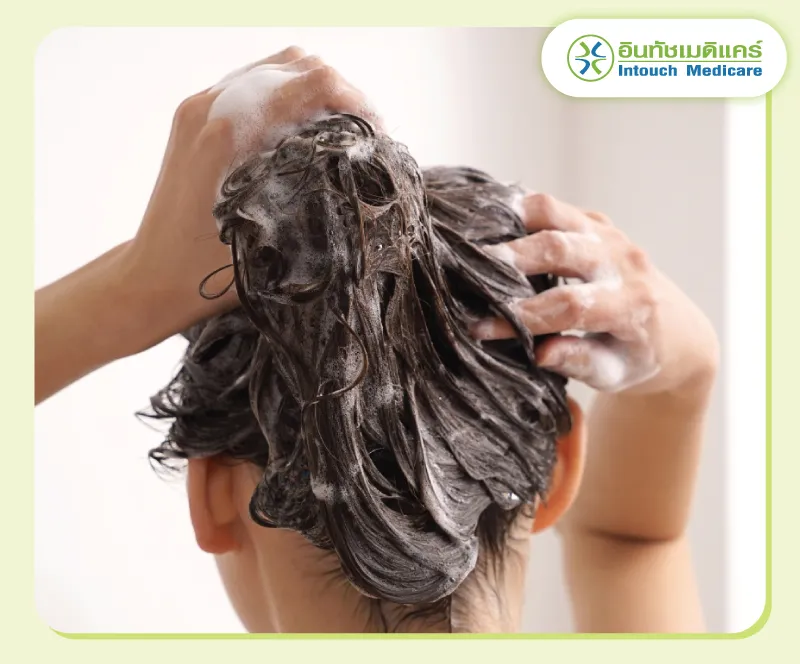
Use a dandruff or antifungal shampoo.
Treated by using anti-dandruff medicine. Used to treat fungal infections on the skin, including Selenium Sulfide (selenium sulfide).
|
It can also be applied thinly to treat ringworm. Whether it's tinea versicolor on the scalp or skin on other areas of the body, it can be used.
How much does it price to treat Tinea Capitis?
Treatment prices 830 - 1500 baht
Note: Prices can change depending on the severity of symptoms and do not include drug delivery costs.
Tinea Capitis It is a disease that is very close to us because it occurs on our scalp. Can communicate with each other through touch. It is caused by a dermatophyte fungus. Anyone who has an itchy scalp Your hair is falling out in patches and is flaky and doesn't go away. You may be suffering from a Tinea Capitis.
|
If anyone who has these symptoms is worried and is not sure what is wrong with them. I recommend you to see a doctor at Intouch Medicare. We have doctors who have experience in treating Tinea Capitis ready to take care of you.
For more info and make appointment
Hot Line 081-562-7722
Composer : SUPITCHA BUENGJAN, MD.
Last edited : 30/04/2024


